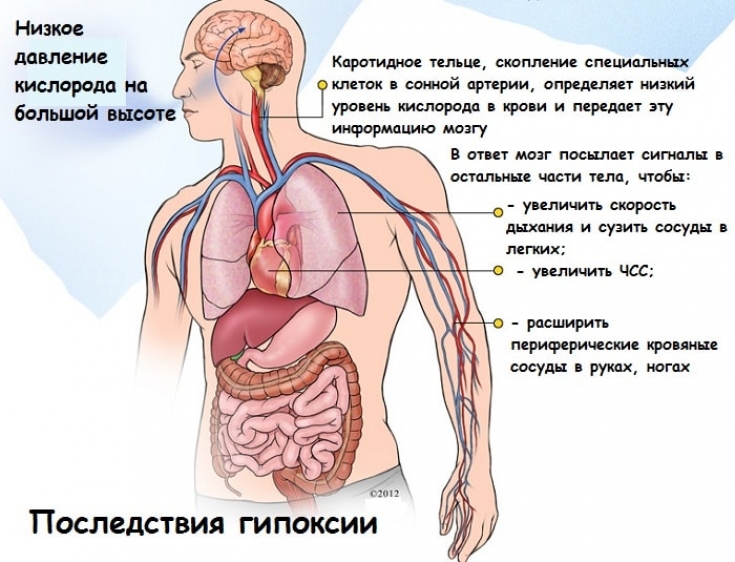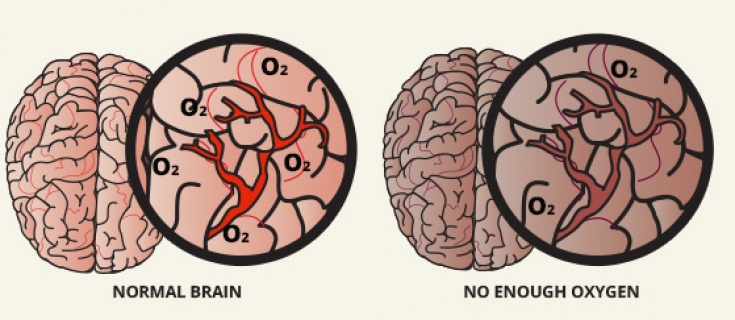Any violations in the human body can lead to inadequate saturation of the brain with oxygen. In times of short-term lack of oxygen, the brain quickly restores its functioning, and nerve cells do not have time to die.
If you do not attach importance to the lack of oxygen, chronic hypoxia can develop and, as a result, the complete death of cells in the brain and death. A person can feel a lack of oxygen in the body for many years and not even suspect that it is not a matter of nervous breakdowns or ecology, but of a disease that, at the first symptoms, should be treated and preventive measures taken.
Cerebral hypoxia or just fatigue
Oxygen starvation of the brain or hypoxia of the brain – this is a condition that develops due to insufficient oxygen in the nerve tissues, which leads to the death and cessation of the central nervous system.
Symptoms of cerebral hypoxia can be confused with other diseases or just a general malaise in the initial stages. And it is precisely these seemingly insignificant symptoms that deserve close attention.
Tranquil neglect of one's health can lead to more serious problems.

Cerebral hypoxia can develop quickly and become acute, which often leads to coma and death or be chronic and not manifest properly for a long time.
The main symptoms of oxygen starvation or cerebral hypoxia:
1. At first, there is a strong excitability of the nervous system, a feeling of happiness and euphoria, which is replaced by lethargy, severe fatigue and lethargy. Because of such a difference, dizziness begins, the heartbeat quickens, it seems that the earth is moving away from under your feet. Cold sweat begins to come out, convulsions appear;
2. Memory begins to deteriorate, and confusion may occur. What he wanted to do, where he was going, remains unknown to the patient himself, he finds it difficult to navigate in the house. After some time, this condition returns to normal, everything falls into place, and the patient forgets about this case.
3. Another symptom may be a sharp headache bordering on vomiting and dizziness. Especially often this happens in a stuffy room or in crowded places;
Do you know: What happens in the body when lactic acid accumulates?
4. The limbs may be partially disobeyed, the sensitivity of the facial muscles may be dulled, a feeling of numbness. When oxygen starvation passes, the working capacity of the limbs is restored, leaving only pain and misunderstanding;
5. The person becomes nervous, there are unreasonable mood swings: sometimes you want to cry, then laugh;
6. Also a noticeable symptom of hypoxia is sleep disturbance, insomnia appears, frequent waking up in the middle of the night;
7. The patient feels general fatigue, lethargy, lack of concentration, a sharp drop in the quality of life, irritability and aggression appear;
8. If cerebral hypoxia has been chronic for a long time, speech or visual impairments may appear.
What happens in the body during a transient ischemic attack?
Cerebral hypoxia can develop rapidly and become acute, often leading to coma and death. Or wear a chronic form and not manifest properly for a long time.
Causes of oxygen starvation of the brain
Hypoxia in humans is possible as a consequence of the development of another disease and pathological condition. A common cause is a stroke, when some part of the brain is affected.
Also, during a state of shock, the brain receives insufficient oxygen, which entails starvation. Brain hypoxia can develop during carbon monoxide asphyxiation: hemoglobin loses the ability to carry oxygen to the brain and tissues die.
Arterial hypotension - how to live with low blood pressure?
Oxygen starvation develops with anemia, various diseases of the respiratory system, atherosclerotic lesions of the brain vessels. Also, cerebral hypoxia often begins at mountain heights, when there is very low atmospheric pressure.

Prevention and treatment of cerebral hypoxia
If symptoms of acute oxygen starvation are observed, then the patient should immediately provide a flow of fresh air, remove tight clothing and call an ambulance.
If chronic hypoxia develops, the doctor may prescribe a course of drugs that promote normal blood circulation and normalize the general condition of the patient, drugs that normalize the outflow of fluid. He also prescribes treatment according to the stage and course of the disease.
Your doctor may recommend using the Hyperbaric Oxygen Method – the effect of oxygen on a person in a special chamber. For preventive actions, frequent walks in the forest area are prescribed, as well as breathing exercises.








Add a comment